
In a bid to optimize public transport services, Plovdiv Municipality has announced forthcoming changes that will see fewer buses operating during early and late hours on six key routes.
While authorities assert that this reorganization will not significantly inconvenience passengers, concerns have been raised regarding its potential impact on accessibility and affordability, particularly during evening hours.
The municipality argues that the reduction in bus frequency during off-peak hours is a strategic move aimed at streamlining operations.
Georgi Stoilov, Director of OP “Transport Organization and Control,” emphasizes that the changes are based on data indicating low passenger numbers during late courses, suggesting that part of the services may be surplus to current requirements.
Stoilov assures citizens that the alterations will not lead to prolonged waiting times at stops and cites the city’s average daily bus course count of 4300 as evidence that the impact will be minimal.
However, not everyone shares the municipality’s optimism. Gergana Georgieva, an organizer of cultural events in Plovdiv, voices concerns about the practical implications of reduced public transport services, particularly in the evenings.
Georgieva highlights the challenges faced by event organizers and volunteers who rely on public transport to commute home after cultural activities.
She fears that the diminished bus schedules will deter attendees and volunteers alike, potentially leading to lower event turnout and increased reliance on taxis.
Georgieva’s sentiments are echoed by many residents who express skepticism about the reliability of public transport, especially during off-peak hours.
With fewer buses available, some individuals may opt for alternative modes of transportation, such as taxis, to ensure timely travel. However, this shift towards taxi usage comes with its own set of concerns, including the potential for increased fares.
Volodya Domoshenko of the National Association for the Protection of National Carriers and Taxi Drivers warns of a possible rise in taxi tariffs as demand surges due to reduced public transport options.
While current taxi fares stand at 1.09, there is speculation that prices could increase to 1.21, aligning with the minimum tariff observed in comparable cities.
In response to mounting apprehensions, Savina Petkova, Deputy Mayor of Plovdiv Municipality, clarifies that decisions regarding both taxi tariffs and city transport schedules rest with municipal councilors.
Petkova emphasizes the importance of transparency and democratic decision-making in addressing the concerns of residents and stakeholders alike.
The proposed changes to public transport services in Plovdiv underscore the delicate balance between efficiency and accessibility.
While optimization efforts aim to improve operational efficiency, they must also consider the diverse needs of the city’s residents, particularly those reliant on public transportation for daily commutes and cultural activities.
As stakeholders engage in dialogue to navigate these challenges, the ultimate goal remains ensuring a transportation system that is both reliable and inclusive.
This article was created using automation and was thoroughly edited and fact-checked by one of our staff editorial members
